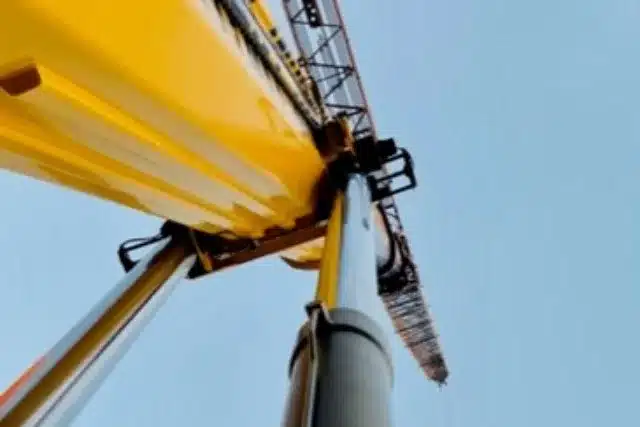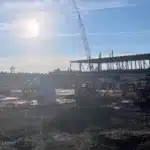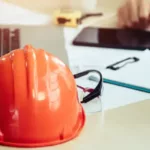Crane safety is crucial to any construction project or industrial operation involving cranes. Cranes are powerful machines that are used to lift and move heavy materials and equipment. However, their immense size and weight, coupled with the loads they carry, also make them potentially hazardous.
While cranes are incredibly useful, there are also risks associated with their operation. If a crane is not set up properly, it can overturn. This can happen if the ground or crane is not level, the crane is overloaded, or due to operator error. Cranes can collide with other obstructions on the job site, or come into contact with power lines or other electrical sources, resulting in serious accidents or fatalities. When cranes are used to lift heavy objects, there is also a risk that those objects could fall or shift, causing injury or worse. Unfortunately, crane accidents continue to occur, despite efforts to promote crane safety. It’s crucial to ensure that cranes are properly maintained, operated by certified and qualified crane operators, and used within their load capacity limits to prevent accidents from occurring.
Our crane safety experts compiled some essential safety tips to prevent crane-related injuries and fatalities.
- Certified Operators: Cranes must be operated only by trained, certified, and qualified crane operators with the necessary knowledge and experience to operate them safely. OSHA requires employers to ensure that their crane operators are certified and qualified. (See 29 CFR 1926.1427)
- Proper training: Crane operators must receive proper training and certification before operating a crane. The training needs to cover all the aspects of crane operation, including safety procedures, proper use of equipment, and emergency response.
- Proper Personal Protective Equipment: Crane operators must wear the appropriate personal protective equipment, including hard hats, safety glasses, gloves, and safety harnesses. Ground crews must always wear a hard hat if they are working anywhere near a crane.
- Inspection of Equipment: Cranes must be inspected regularly to ensure they are in good working condition. Crane operators check for damages, wear and tear, and faulty components. Crane inspections are critical in preventing accidents and ensuring the safety of workers and bystanders.
- Communication: Effective communication is essential to crane safety. It is best to work as a team. Knowledge of proper hand signals is key, and crane operators should communicate with the signal person and other crew members to ensure the safety of all those working around the crane.
- Proper Ground Conditions: The crane must be set up on firm, level ground and be stable to prevent tipping, shifting, or movement.
- Follow Load Capacity Guidelines: Crane operators should never exceed the crane’s load capacity as it can lead to a catastrophic accident. They must always check the load capacity guidelines before lifting any object.
- Clearance: It’s important to ensure there is enough clearance around the crane to prevent collisions with other objects or people. To avoid accidents, the work area should be cleared of all obstacles, including power lines and trees. No one should enter a barricaded area near a crane or go under crane booms or suspended loads.
- Weather Conditions: Crane operators should be aware of the weather conditions before starting to work. They should avoid working during high winds, thunderstorms, or other hazardous weather conditions.
- Emergency Procedures: It’s important for crane operators and other personnel working with cranes to be familiar with emergency procedures and receive regular training on responding to emergencies.
- Transport, Storage, and Shutdown: When transporting a crane, ensure the proper permits are in place. Comply with DOT compliance inspections if applicable. After the work is completed, crane operators should properly store the equipment to prevent any damage or accidents. Secure all items, such as jibs, outrigger pads, and other components, and clean any rock or debris from the carrier. Ensure the headache ball or block is attached properly. Follow proper safety procedures, such as laying the boom down during a storm or shutdown.
By following these safety tips, you can ensure that cranes are used safely and effectively on construction sites and other industrial settings. Safety Consulting Specialists can assist you or your employees in becoming a certified crane operator. We hold a monthly crane operator course in Raleigh, NC, or we can bring the course to your facility. Additionally, we offer annual and third-party crane inspections and load testing. Crane inspections are critical in preventing accidents and ensuring the safety of workers and bystanders. Regular inspections and load testing help to identify potential hazards before they cause harm, reducing the risk of injury and property damage. We are always available to speak to you and answer any of your crane-related safety questions. Contact us at (919) 417-2139 for more information about our crane safety services. We look forward to hearing from you.


